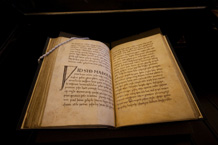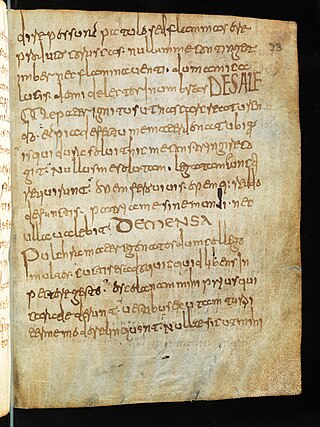Related Research Articles

The Exeter Book, also known as the Codex Exoniensis or Exeter Cathedral Library MS 3501, is a large codex of Old English poetry, believed to have been produced in the late tenth century AD. It is one of the four major manuscripts of Old English poetry, along with the Vercelli Book in Vercelli, Italy, the Nowell Codex in the British Library, and the Junius manuscript in the Bodleian Library in Oxford. The book was donated to what is now the Exeter Cathedral library by Leofric, the first bishop of Exeter, in 1072. It is believed originally to have contained 130 or 131 leaves, of which the first 7 or 8 have been replaced with other leaves; the original first 8 leaves are lost. The Exeter Book is the largest and perhaps oldest known manuscript of Old English literature, containing about a sixth of the Old English poetry that has survived.
"The Husband's Message" is an anonymous Old English poem, 53 lines long and found only on folio 123 of the Exeter Book. The poem is cast as the private address of an unknown first-person speaker to a wife, challenging the reader to discover the speaker's identity and the nature of the conversation, the mystery of which is enhanced by a burn-hole at the beginning of the poem.

Anglo-Saxon riddles are a significant genre of Anglo-Saxon literature. The riddle was a major, prestigious literary form in early medieval England, and riddles were written both in Latin and Old English verse. The pre-eminent composer of Latin riddles in early medieval England was Aldhelm, while the Old English verse riddles found in the tenth-century Exeter Book include some of the most famous Old English poems.

Andrew Philip McDowell Orchard, is a British academic of Old English, Norse and Celtic literature. He is Rawlinson and Bosworth Professor of Anglo-Saxon at the University of Oxford and a fellow of Pembroke College, Oxford. He was previously Provost of Trinity College, Toronto, from 2007 to 2013. In 2021, claims of sexual harassment and assault by Orchard were publicized, which were alleged at universities where he has worked, including the University of Cambridge and the University of Toronto.
The "Leiden Riddle" is an Old English riddle. It is noteworthy for being one of the earliest attested pieces of English poetry; one of only a small number of representatives of the Northumbrian dialect of Old English; one of only a relatively small number of Old English poems to survive in multiple manuscripts; and evidence for the translation of the Latin poetry of Aldhelm into Old English.

The Bern Riddles, also known as Aenigmata Bernensia, Aenigmata Hexasticha or Riddles of Tullius, are a collection of 64 rhythmic Latin riddles, named after the location of their earliest surviving manuscript, which today is held in Bern : the early eighth-century Codex Bernensis 611.
Exeter Book Riddle 27 is one of the Old English riddles found in the later tenth-century Exeter Book. The riddle is almost universally solved as 'mead'.
Exeter Book Riddle 47 is one of the most famous of the Old English riddles found in the later tenth-century Exeter Book. Its solution is 'book-worm' or 'moth'.

The Exeter Book riddles are a fragmentary collection of verse riddles in Old English found in the later tenth-century anthology of Old English poetry known as the Exeter Book. Today standing at around ninety-four, the Exeter Book riddles account for almost all the riddles attested in Old English, and a major component of the otherwise mostly Latin corpus of riddles from early medieval England.
Exeter Book Riddle 24 is one of the Old English riddles found in the later tenth-century Exeter Book. The riddle is one of a number to include runes as clues: they spell an anagram of the Old English word higoræ 'jay, magpie'. There has, therefore, been little debate about the solution.
Exeter Book Riddle 51 is one of the Old English riddles found in the later tenth-century Exeter Book. Its solution is 'quill pen and three fingers', 'whose figurative "journey" leaves a dark track of letters and words on the page' and it stands accordingly as an important literary example of the international riddle type, the Writing-riddle, whose most basic form is 'white field, black seeds'. In the reading of Helen Price, the riddle suggests that 'writing is a journey, but it is not one of a human being alone. The riddle is selfconsciously aware of the connected nature of human, tool, and animal'.
Exeter Book Riddle 45 is one of the Old English riddles found in the later tenth-century Exeter Book. Its solution is accepted to be 'dough'. However, the description evokes a penis becoming erect; as such, Riddle 45 is noted as one of a small group of Old English riddles that engage in sexual double entendre, and thus provides rare evidence for Anglo-Saxon attitudes to sexuality, and specifically for women taking the initiative in heterosexual sex.
Exeter Book Riddle 44 is one of the Old English riddles found in the later tenth-century Exeter Book. Its solution is accepted to be 'key'. However, the description evokes a penis; as such, Riddle 44 is noted as one of a small group of Old English riddles that engage in sexual double entendre, and thus provides rare evidence for Anglo-Saxon attitudes to sexuality.
Exeter Book Riddle 25 is one of the Old English riddles found in the later tenth-century Exeter Book. Suggested solutions have included Hemp, Leek, Onion, Rosehip, Mustard and Phallus, but the consensus is that the solution is Onion.
Exeter Book Riddle 33 is one of the Old English riddles found in the later tenth-century Exeter Book. Its solution is accepted to be 'Iceberg'. The most extensive commentary on the riddle is by Corinne Dale, whose ecofeminist analysis of the riddles discusses how the iceberg is portrayed through metaphors of warrior violence but at the same time femininity.
Exeter Book Riddle 12 is one of the Old English riddles found in the later tenth-century Exeter Book. Its solution is accepted to be 'ox/ox-hide'. The riddle has been described as 'rather a cause celebre in the realm of Old English poetic scholarship, thanks to the combination of its apparently sensational, and salacious, subject matter with critical issues of class, sex, and gender'. The riddle is also of interest because of its reference to an enslaved person, possibly ethnically British.
Exeter Book Riddle 61 is one of the Old English riddles found in the later tenth-century Exeter Book. The riddle is usually solved as 'shirt', 'mailcoat' or 'helmet'. It is noted as one of a number of Old English riddles with sexual connotations and as a source for gender-relations in early medieval England.

Exeter Book Riddle 26 is one of the Old English riddles found in the later tenth-century Exeter Book.
Exeter Book Riddle 5 is one of the Old English riddles found in the later tenth-century Exeter Book. Its usual solution is 'shield', but other solutions, such as 'chopping board', are also possible.
Exeter Book Riddle 9 is one of the Old English riddles found in the later tenth-century Exeter Book, in this case on folio 103r–v. The solution is believed to be 'cuckoo'. The riddle can be understood in its manuscript context as part of a sequence of bird-riddles.
References
- ↑ George Philip Krapp and Elliott Van Kirk Dobbie (eds), The Exeter Book, The Anglo-Saxon Poetic Records, 3 (New York: Columbia University Press, 1936), pp. 184-85.
- ↑ Jessica Lockhart, translation and commentary for Riddle 7, The Riddle Ages: Early Medieval Riddles, Translations and Commentaries, ed. by Megan Cavell, with Matthias Ammon, Neville Mogford and Victoria Symons (Birmingham: University of Birmingham, 2020 [first publ. 2013]).
- ↑ Richard Fahey, 'Encoded References in Exeter Book Bird-Riddles', Medieval Studies Research Blog: Meet us at the Crossroads of Everything (6 December 2019).
- ↑ Richard Marsden, The Cambridge Old English Reader (Cambridge: Cambridge University Press, 2004), p. 313 ISBN 9780521454261.
- ↑ Old and Middle English c. 890-c. 1400: An Anthology, ed. by Elaine Treharne, 2nd edn (Oxford: Blackwell, 2004), p. 73.